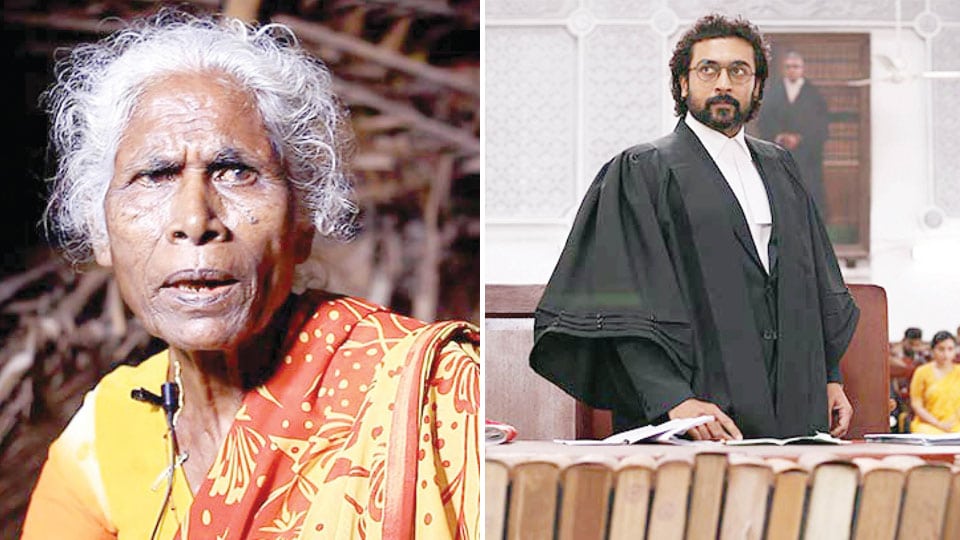
While leafing through the recent copy of The Week magazine, I ran into the cover-story on Justice Chandru Krishnaswamy (Chandru for short), who had retired recently and a connected interview of Suriya Sivakumar (Suriya for short), the famous Tamil film actor. Having been educated in law and seen the portals of criminal Courts and High Court in Bengaluru in the early sixties, naturally I was attracted to this article.
Later as a journalist and entrepreneur, I have both suffered and benefited from the judiciary and also the Police. The experience of Justice Chandru was a testimony to how an independent India treated and is still treating its tribals, the poor, the downtrodden and those oppressed by the civil society.
This article was inspired not so much by that phenomenon of a High Court Judge Chandru as by the recently released hit film Jai Bhim with actor Suriya in the lead and Prakash Raj playing a cameo role as a senior IPS Enquiry Officer.
Be that as it may, there is no denying the fact that Judge Chandru was an extraordinary social activist, advocate of the Good Samaritan kind and a phenomenon as a Judge of the High Court. Imagine a Judge hearing at least 75 cases a day and clearing 96,000 cases in six-and-a-half-years!
And can you imagine, in these days where Judges may retire as Judges but soon they (or most of them) are seen occupying some High Office or ensconced in a gubernatorial position, this Judge Chandru Krishnaswamy had vowed that he would neither practice in the Supreme Court nor head Tribunals. He took up teaching as a retired Judge. Sure his students would immensely benefit from a Guru of his kind. The article mentions of two books he has written: 1. Listen to My Case! When Women Approach the Courts in Tamil Nadu. 2. My Judgements in the Light of Ambedkar.
I guess the title of the film is taken from the second book mentioned above, probably as a tribute to Dr. Bhimrao Ramji Ambedkar, the Architect of our Constitution, that great Social Reformer and Statesman while the story of the film was picked from the first book ‘Listen to My Case! When Women Approach the Courts in Tamil Nadu’. The tribal woman Parvathi’s case shown in Jai Bhim film must be from this book.
Since the book outlines the stories of 20 women from the marginalised communities and their fight for justice, we can expect sequel-like films produced based on those episodes because this film has become a big hit. Let it be.
And that was the reason I sat down for over two hours before the TV watching the film on Amazon Prime Video. The film shows the brutality of the Police, the corruption, submitting in a servile manner to local goons and village landlords who are denying the tribals and the marginalised amongst our own people their right to live with dignity, liberty, equality (before law) and fraternity. Here comes an advocate Chandru like a beacon of light to the harassed and battered life of Parvathi, a tribal woman, whose husband was picked up by the Police on a false charge of theft and was missing and finally found murdered by Police torture.
Fortunately, the two Judges on the Bench were found quite condescending in the case despite the vehement denials, opposition and offering of allurements to the tribals and even advocate Chandru to withdraw the case! Advocate Chandru was unshakable in his determination to get at the truth — no wonder he gently brushes aside the mocking words of the Public Prosecutor that he must have ‘luck’ on his side to win the case. Advocate Chandru says ‘no, truth’ — meaning that whoever has ‘truth’ on his side will win. This kind of commitment to a noble cause, ability to uphold ethical values in all walks of life was, in a way, inculcated in Judge Chandru’s life because of the right kind of education he received both in his primary school and later in the college. He had studied in a Ramakrishna Mission School in T. Nagar.
This is a must-see film for those who are in judiciary, who practice law and, of course, the Police. What about politicians? Why should they? Like Brahma, they are the ‘creators of judiciary, of laws and the Police’. Om Shanti.
Moral of the film according to a wag!
Judiciary and the Police should work in tandem to deliver justice in criminal cases, specially, to the tribals, the deprived and the poor. If justice ‘delivery’ cannot happen ‘naturally’ due to corruption, incompetence and autocracy, then the Judges may resort to ‘Caesarian’ operation to ‘deliver’ the baby justice and also to save the mother — The System.
e-mail: [email protected]








Recent Comments